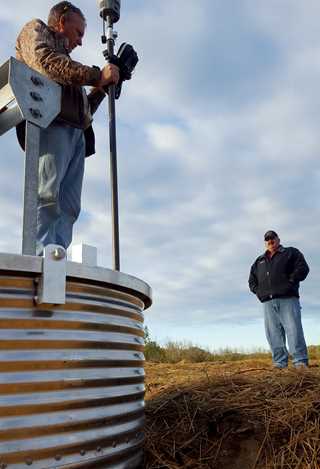Michigan community rejoices at rebirth of local marsh
“The amount of people in this community who utilize this marsh is amazing.”
“The amount of people in this community who utilize this marsh is amazing.”
Growing up within walking distance of Manistee Marsh in northwest Michigan, Ducks Unlimited member Mark Mantych remembers the 160-acre wetland as a vibrant gathering spot for outdoorsmen and women.
You could fish and walk along dikes. The northern pike fishing was incredible. Duck hunting was phenomenal. All along Highway M-55, a line of cars would park for opening day of fur trapping season, Mantych said.
The coastal wetland, now part of the 3,920-acre Manistee River State Game Area, was drained in the early 1900s to support farming operations. The Michigan Department of Natural Resources eventually acquired the property, and in 1969 it was converted to a managed wetland system with pumps and dikes.
It flourished and provided important waterfowl habitat. Until around 1990, when the pump broke.
When that pump died, the marsh died, Mantych said.
Without the ability to manage water levels, Manistee Marsh was no longer viable wetland habitat. Cattails took over. Potholes filled in, the fisheries died and much of the duck-friendly vegetation was choked off.

In keeping with its unofficial status as a natural community center, area residents came to help. Several community members, private businesses and the Manistee Area Chapter of Ducks Unlimited pitched in to repair and keep the original pump limping along, which provided some relief. But a permanent solution was needed.
Following many years of behind-the-scenes logistical work, Ducks Unlimited and several partners in 2016 replaced the pump, which allows the DNR to properly control water levels at Manistee Marsh. New water-control structures allow the DNR to manage the marsh to meet habitat needs of numerous species of plants and animals.
The potential the marsh has to support additional waterfowl during migration, in particular the fall hunting season, made the Manistee Marsh project a priority for us, said Dane Cramer, Ducks Unlimiteds regional biologist in Michigan.
The results of the enhancement project so far have pleased the DNR and Ducks Unlimited. But the neighbors are those who most appreciate their local wetland getting a rebirth.
The amount of people in this community who utilize this marsh is amazing, Mantych said. Weve got a lot of very happy people. Ive toured the area with school groups, and Ive seen Audubon members spending time there bird watching.
Funding in part came from a Great Lakes Restoration Initiative grant. Other partners include Michigan Department of Environmental Quality, U.S. Army Corps of Engineers and Michigan Department of Transportation.
Ducks Unlimited uses cookies to enhance your browsing experience, optimize site functionality, analyze traffic, and deliver personalized advertising through third parties. By continuing to use this site, you agree to our use of cookies. View Privacy Policy